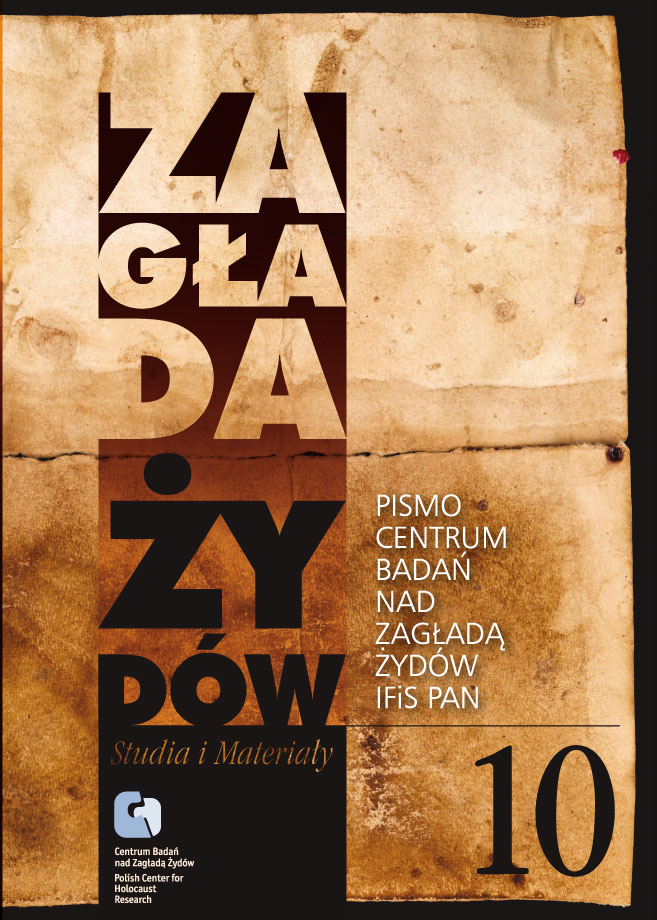(The “Karski Report” – Controversies and Interpretations
Zagłada Żydów. Studia i Materiały, No. 10 (2014), Pages: 96-130
Submission Date: 2020-10-22Publication Date: 2014-12-01
 https://doi.org/10.32927/ZZSiM.518
https://doi.org/10.32927/ZZSiM.518
Abstract
Much has been said and written about Jan Karski, especially in 2014, his centennial year. The Karski story tells us about a hero of the Polish wartime resistance who risked his life to bring the terrible news about the Holocaust to Western leaders who remained indifferent. An essential part of the Karski story is an account of the ‘report’ which he brought to the West, the ‘Karski report’. However, when we examine archival evidence and follow a chain of events in November 1942, we see that the report is a two-page summary in English which the Polish Government issued on November 24 when it made an official announcement about the Warsaw ghetto deportations. Over the years, historians began to refer to this as the ‘Karski report’, but on the day it was issued, Karski had not yet arrived in London. The materials which Karski took with him from Warsaw were passed to a Polish agent in Paris on October 4th who then placed them on a separate route to London where we think they arrived just before November 14th. We know which documents the ‘Karski report’ was based on so if these were among the materials which arrived by November 14th and if that was the ‘post’ which Karski delivered to Paris, then it would be correct to say that these documents were carried through occupied Europe by Karski. But there is no reliable list of the contents of this ‘post’ and since there were a number of couriers carrying materials which were duplicated in order to increase their chances of reaching London, it is possible that the documents on which the ‘Karski report’ was based were brought to London by a courier other than Karski.
License
Copyright (c) 2014 Author&"Holocaust Studies and Materials"

This work is licensed under a Creative Commons Attribution 4.0 International License.
https://creativecommons.org/licenses/by/4.0
The journal is published under the Diamond Open Access Standard, CC-BY-4.0 Deed - Attribution 4.0 International - Creative Commons
Similar Articles
- Agnieszka Haska, Keep Calm and Be Like Jan Karski , Zagłada Żydów. Studia i Materiały: No. 11 (2015)
- Mordechay Giloh, Distinct Profiles and Characteristics of Jewish and non-Jewish Concentration Camp Survivors in Sweden , Zagłada Żydów. Studia i Materiały: No. 8 (2012)
- Michal Trebacz, Karski–Zygielbojm. The Story of a Conversation , Zagłada Żydów. Studia i Materiały: No. 18 (2022)
- Marta Janczewska, Death in the German Official Language as Exemplified by Jürgen Stroop’s Report , Zagłada Żydów. Studia i Materiały: No. 12 (2016)
- Jeffrey Kopstein, Jason Wittenberg, Neighborly violence, social science, and superficial similarities , Zagłada Żydów. Studia i Materiały: No. 21 (2025)
- David Engel, Jan Marek Chodakiewicz, After the Holocaust , Zagłada Żydów. Studia i Materiały: No. 1 (2005)
- Agnieszka Haska, “I Crossed the Border…” 1940 Testimonies of Refugees from Occupied Poland , Zagłada Żydów. Studia i Materiały: No. 18 (2022)
- Marta Janczewska, Jan Jagielski 1937-2021 , Zagłada Żydów. Studia i Materiały: No. 17 (2021)
- Natalia Aleksiun, Historiography of the Holocaust on the Polish-Jewish relations in Poland , Zagłada Żydów. Studia i Materiały: No. 1 (2005)
- Michał Głowiński, Jan Błoński „Poor Poles Look at the Ghetto” 20 Years Later , Zagłada Żydów. Studia i Materiały: No. 2 (2006)
1 2 3 4 5 6 7 8 9 10 11 12 13 14 15 16 17 18 19 20 21 22 23 24 > >>
You may also start an advanced similarity search for this article.
 English
English
 Język Polski
Język Polski








